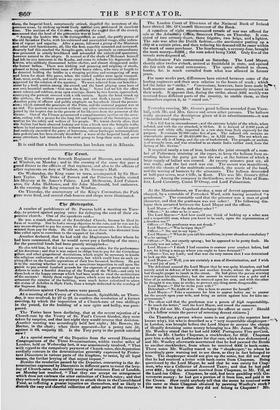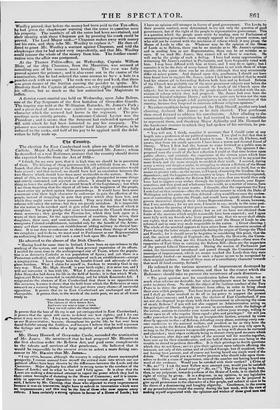At the Mansionhouse, on Tuesday, a man of decent appearance
was charged, by a constable of Portsoken Ward, with having assaulted "a gentleman." The constable said that the prisoner was a man of good character, and that the gentleman was not sober ! The following dia- logue then occurred between the Lord Mayor and the officer.
Lord Mayor—" Was the defendant sober?"
Officer—" As sober as he is now."
The Lord Mayor—" And how could you think of locking up a sober man and a respectable man, whom you knew to be such, upon the representation of a drunken one?"
Officer—" The gentleman was not drunk."
Lord Mayor—" Was he tipsy then?"
Officer—" No, not to say tipsy." Lord Mayor—" What do you call his condition, in your abundant vocabulary? Was lie sprung?" Officer—" No, not exactly sprung ; but he appeared to be pretty fresh, lie certainly was not sober." Lord Mayor—" I think I had occasion to censure your conduct before, had I not, for letting a man go whom you ought to have detained?" Officer—Yes, my Lord; and that was the very reason that I was determined to lock up this man." Lord Mayor—" Well, you are certainly a man of discrimination, and I wish the ward joy of you." The defendant assured the Lord Mayor that be was quite blameless, and had merely acted in defence of his wife and another female, whom the gentleman had thought proper to insult in the street. lie had given the person warning not to repeat his misconduct ; but the answer he received was a poke and a blow of an umbrella. The blow he received upon his arm, and with the other he thought it was time to strike, to prevent any thing more disagreeable. Lord Mayor—" Did he strike your wife?"
Defendant—" No doubt of it. She is here to answer for herself."
Lord Mayor—" Take a summons for him to appear before me to answer for time assault upon your wife, and bring an action against him for false im- prisonment." The officer said that the gentleman was a person of high respectability.. " So much the better," said the Lord Mayor, and issued the summons.
[Why did not Mr. Copeland discharge the officer at once? Should such a fellow retain the power of arresting decent citizens.] On Thursday, a person whose name is not given (the reporter best knows why), but who is described as a "very respectable shopkeeper.' 1
in London, was brought before the Lord Mayor to answer the charge of illegally detaining some money belonging to a Mr. James Woolley. Mr. Woolley stated that he had sold 1000/. Portuguese Five perCent. Bonds to Mr. Charles Chapman, a stockbroker, for 685/. Chapman gave him a check on Ladbrookes for that sum, which was dishonoured; and Mr. Woolley afterwards ascertained that he had pawned the Bonds to ancther stockbroker, from whom be received 600/. in bank-notes. Those notes Mr. Woolley traced to the " shopkeeper," to whom he accordingly gave warning not to use them, as they in fact belonged to him. The shopkeeper would not give up the notes, but did not deny that be bad received a letter with bank-notes from Chapman. Being questioned by the Lord Mayor, he said that he was surety for Chap- man, who was a Collector of Assessed Taxes ; and that he had paid over 4001., being the amount received from Chapman, to Mr. Till, at the Land-tax Office. Chapman, he said, had been gambling with Go- vernment money : he had got a portion of it from him, and paid it to the Crown. How could anybody tell that the notes he received were the same as those Chapman obtained by pawning Woolley's stock ? how was be to know that they did not belong to Chapman ? Mr.
Woolley proved, that belime the money had been paid to the Tax-office, Ito had given the shopkeeper warning that the notes in question were Ida property. The numbers of all the notes had been ascertained, and their identity with those Chapman got by pawning his stock could be proved. The Lord Mayor said—" Chapman makes away with money not his own, and then robs Mt. Woolley to replace it." He then of- fered to grant Mr. Woolley a warrant against Chapman, and told the shopkeeper that he had acted very imprudently, and that Mr. Woolley could recover the whole of the money from him. The further exami- nation into the affair was postponed.
At the Thames Police-office, on Wednesday, Captain William lair, of the ship Clansman, from the Mauritius, m as accused of assaulting one of his seamen most brutally. The ease was fully proved against the prisoner; and it also came out in the course of the examination, that he had ordered the same seaman to bo-e a hole in a .,powder-cask with an auger. The cask was so dry and hid, that there ,.--"—seas great danger of the friction causing the powder to ignite. Mr. Broderip fined the Captain 51. and costs,—a very slight punishment for Ina offence, but us much us the law authorized the Magistrate to
A district court-martial was held on Wednesday, upon John Bolton, one of the Pay- Sergeants of the first battalion of Grenadier Guards. The inquiry was held at the Wellington Barracks, St. James's Park ; and a great deal of interest was excited in consequence of the high character which the accused had borne in the regiment. The pro- ceedings were strictly private. Lieutenant-Colonel Lyster was the President ; and it seems that the Sergeant had embezzled upwards of 40/. with which he had been intrusted to pay his company. The prisoner was sentenced to three months' hard labour at Brixton, to be reduced to the ranks, and half of his pay to be applied until the defal- cation be fully made up.



























 Previous page
Previous page